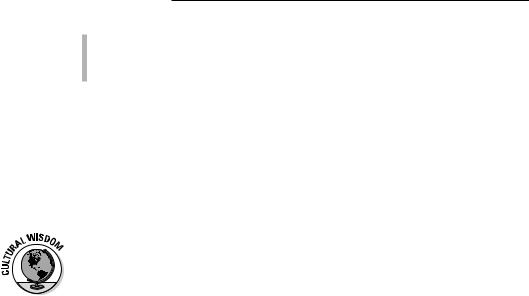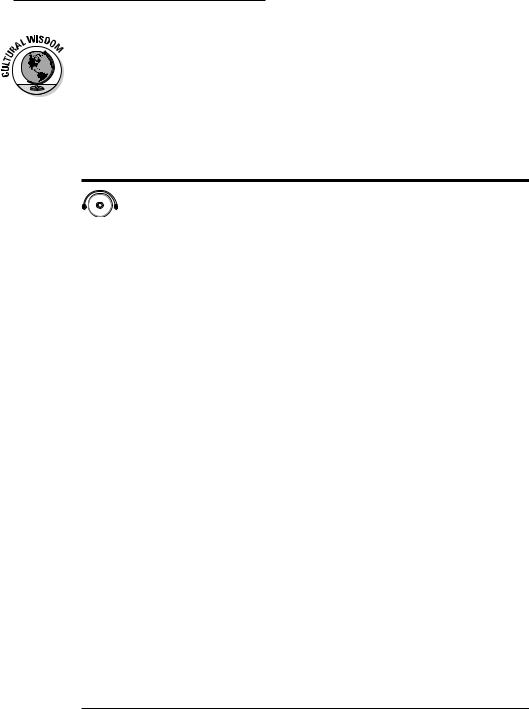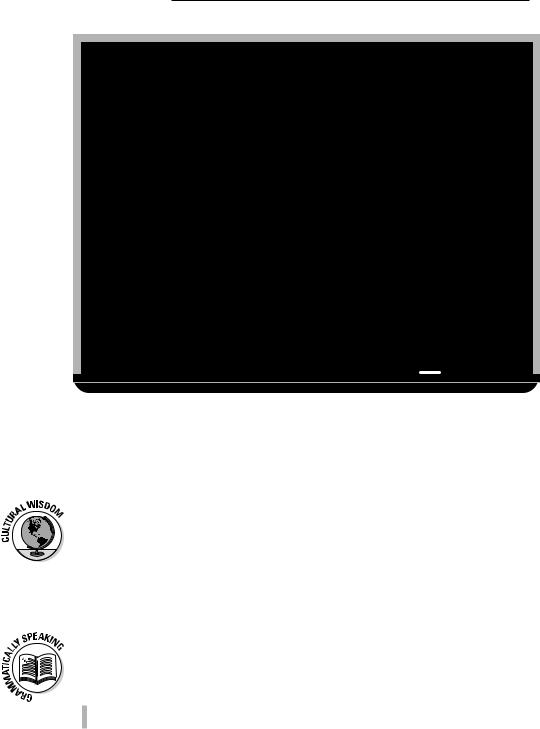
- •About the Authors
- •Dedication
- •Acknowledgments
- •Table of Contents
- •Introduction
- •About This Book
- •Conventions Used in This Book
- •Foolish Assumptions
- •How This Book Is Organized
- •Icons Used in This Book
- •Where to Go from Here
- •The French You’re Familiar With
- •Idioms and Popular Expressions
- •Key Parts of Speech
- •Cavorting with Verbs
- •Forming Sentences and Questions
- •The French Alphabet
- •Uttering Vowel and Consonant Sounds
- •Greetings: Formal and Friendly
- •Asking Questions to Get to Know People
- •Counting Your Lucky Stars: Numbers
- •Using the Calendar and Dates
- •Telling Time in French
- •Discussing Where You Live with the Verb “Habiter”
- •Discussing Daily Routine with Reflexive Verbs
- •Using Possessive Adjectives to Introduce Your Family Members
- •Basic Questions and Polite Expressions
- •Stating Your Preferences
- •Talking about Your Livelihood
- •Chatting about the Weather
- •Deciding to Keep in Touch
- •Getting Direction about Directions
- •Dining Out
- •Going to the Market
- •Going Shopping
- •Going Out with the Verb “Sortir”
- •Having Fun with the Verb “S’amuser”
- •Oh, the Places You’ll Go!
- •Making Plans with Friends
- •Making a Phone Call
- •Livin’ in the Past: Using the Past Tense
- •Playing Sports and Games
- •Going to the Beach
- •Setting Up Camp
- •Enjoying Quieter Pursuits
- •Where Do You Want to Go?
- •Getting Ready for Your Trip
- •Getting Current with Currency
- •Going to the Bank
- •Using Credit Cards and ATMs
- •Getting through the Airport
- •Navigating Buses, Trains, and Subways
- •Getting Around by Car
- •Finding Accommodations
- •Checking In to a Hotel
- •Checking Out of a Hotel
- •Getting Help Fast
- •Getting Medical Help
- •Handling Legal Matters
- •Label the Things in Your House
- •Write Your Shopping Lists in French
- •Listen to French Music
- •Watch French Movies
- •Tune in to TV5
- •Read French Publications
- •Take a Class
- •Join a French Association
- •Join an Online Chat or Pen Pal Forum
- •Using “Tu” When You Mean “Vous”
- •Using “Bonne nuit!” for Good-Bye
- •Using “Garçon” or “Porteur” to Address Service Staff
- •Saying “Je suis excité(e)” to Indicate Excitement
- •Saying “Je suis chaud(e)/froid(e)” to Say You’re Hot or Cold
- •Saying “Je suis plein/e” to Mean You’re Full
- •Using “de la glace” to Request Ice
- •Using “Je suis . . . ans” to Tell Your Age
- •Asking for Change with “J’ai besoin de change”
- •Using the Verb “Visiter” in Reference to People
- •“À mon avis”
- •“C’est pas vrai”
- •“Avec plaisir”
- •“C’est génial”
- •“À votre santé”
- •“À vos souhaits”
- •“Quelle horreur!”
- •“À bientôt”
- •“Passez-moi un coup de fil!”
- •“On y va!” or “Allons-y!”
- •“Je n’en sais rien”
- •“Je n’en reviens pas”
- •“Ça vaut la peine”
- •“C’est pas grave”
- •“N’importe”
- •“Tu cherches midi à 14h”
- •“Prenons un pot!”
- •Regular French Verbs
- •Auxiliary French Verbs
- •Track Listing
- •Customer Care
- •Index

Chapter 12
Recreation and the Outdoors
In This Chapter
Playing team and individual sports with the verbs jouer and faire
Focusing on a few popular pastimes
Enjoying a good book with the verb lire
All work and no play makes Jacques un garçon ennuyeux (zhahk uhN gahr-sohN ahN-nwee-yuh) (Jack a dull boy). Whether you’re playing or
watching sports, going to the beach, camping, or pursuing quieter hobbies, you’re sure to have a good time if you know some of the language. In this chapter, we give you ample sports and activity-related vocabulary terms so that you can converse with others about the kinds of things you like to do. We also explain when to use the verb faire de (fehr duh) versus when to use jouer à (zhooh-ey ah), both of which mean to play.
Playing Sports and Games
It seems that every nation has a national pastime. In the U.S. le base-ball (luh behz-bohl) (baseball), le basket (ball) (luh bahs-keht [bohl]) (basketball), and le football américain (luh fooht-bohl ah-mey-ree-kaN) (American football) are popular, as is le hockey (luh oh-keh) (hockey) in Canada. Some of these sports — le football américain and le base-ball, for example — remain uncommon in Europe. Here are some pastimes that are important in a few French-speaking countries and regions:
Le cyclisme (luh see-kleez-muh) (cycling) is very popular in France and Belgium.
Le foot(ball) (luh fooht[bohl]) (soccer) is a favorite sport in Canada, France, Belgium, and in many African francophone countries. Note: In Canada, soccer is called le soccer (luh soh-kuhr).
Le rugby (luh rewg-bee) (rugby) is popular in Southern France.
www.ATIBOOK.ir

190 Part II: French in Action
Le ski (luh skee) (skiing) is popular in Switzerland.
Le hockey (sur glace) (luh hoh-keh [sewr glahs]) ([ice] hockey) is popular in Canada.
Among the most popular sports-spectacles (spohr-spehk-tah-kluh) (spectator sports) are le foot(ball), les courses de chevaux (ley koohrs duh shuh-voh) (horse racing), and les courses automobiles (ley koohrs oh-toh-moh-
beel) (automobile racing). The best known horse race is le Grand Prix de Longchamp (luh grahN pree duh lohNg-shahN) in Paris. As for les courses automobiles, there are two extremely famous ones: les 24 heures du Mans (ley vaNt kah-truhr dew mahN) (24 Hours of Le Mans) and le Rallye de MonteCarlo (luh rah-lee duh mohN-tey-kahr-loh) (Monte Carlo Rally).
First held in 1903, Le Tour de France (luh toohr duh frahNs) is the largest course du cycliste (koohrs dew see-kleest) (cycling race) in the world. Every summer, cyclists from all over the world bike over 2,000 miles (3,200 kilometers). The race begins in a different city each year but always ends in Paris, along the Champs-Elysées (shahN-zeh-lee-zey). The course is very demanding, traveling through the Alps and Pyrenees mountain regions and under difficult weather conditions. Le maillot jaune (luh mah-yoh zhohn) (the yellow jersey) is awarded to the winner.
The French use two different verbs when talking about playing sports: faire de (fehr duh) is mostly used for individual sports and jouer à (zhooh-ey ah) for team sports or games. Both verbs essentially mean to play, although the specific translation varies by activity. They can also be used interchangeably. The following sections have the details.
Using “faire” for individual sports
Individual sports such as la natation (lah nah-tah-syohN) (swimming), le tennis (luh tey-nees) (tennis), la randonnée (lah rahN-doh-ney) (hiking), le cyclisme (luh see-kleez-muh) (cycling), la voile (lah vwahl) (sailing), and la planche à voile (lah plahNsh ah vwahl) (windsurfing) are also popular.
When you talk about individual sports, you use the verb faire. Faire is an irregular verb, and it uses the preposition de (duh) and a definite article the — le (luh) or la (lah), depending on the gender of the sport. (Keep in
mind that de + le contracts to form du, whereas de + la remains de la.) With sports, the verb faire can be translated in a number of ways, such as to play or to do, and sometimes, it’s not translated at all. In such cases, the sport serves as the verb, such as to hike or to ski.
Table 12-1 shows sentences using faire so that you can easily see how the form changes with the gender of the sport. (To see the general conjugation of faire, refer to Chapter 2.)
www.ATIBOOK.ir

Chapter 12: Recreation and the Outdoors 191
Table 12-1 |
The Verb “faire” When Used with Sports |
|
French |
Pronunciation |
Translation |
Je fais du tennis. |
zhuh feh dew tey-nees. |
I play tennis. |
|
|
|
Tu fais du vélo. |
tew feh dew vey-loh. |
You bike, You |
|
|
go biking. |
Il/Elle/On fait du ski. |
eel/ehl/ohN feh dew skee. |
He/She/One skis, He/ |
|
|
She/One goes skiing. |
Nous faisons de |
nooh fuh-zohN duh lah nah- |
We swim, We |
la natation. |
tah-syohN. |
go swimming. |
Vous faites une |
vooh feh-tewn rahN-doh-ney. |
You hike, You |
randonnée. |
|
go hiking. |
Ils/Elles font du |
eel/ehl fohN dew shvahl. |
They go horseback |
cheval. |
|
riding. |
Here is a list of some individual sports or activities that you may enjoy — and that use the verb faire:
faire une promenade (fehr ewn prohm-nahd) (to take a walk, to stroll)
faire du surf (fehr dew sewrf) (to surf, to go surfing)
faire du vélo (fehr dew vey-loh) (to bike, to go biking)
faire du jogging (fehr dew zhoh-geeng) (to jog, to go jogging)
faire de l’exercice (fehr duh lehk-sehr-sees) (to exercise)
faire du patin à roulettes/à glace (fehr dew pah-taN ah rooh-leht/ ah glahs) (to roller skate, to ice skate)
faire du roller (fehr dew roh-luhr) (to rollerblade)
faire du cheval/de l’équitation (fehr dew shvahl/duh ley-kee-tah-syohN) (to go horseback riding)
For more winter and summer sports, head to the sections “Going Downhill — or Cross-country — Skiing” and “Going to the Beach.”
Using “jouer” for team sports
Today, the French are much more sports minded than in the past. Young people regularly join teams and compete in sports such as le basket, le foot(ball), and le rugby. When talking about team sports, you usually use the verb jouer.
www.ATIBOOK.ir

192 Part II: French in Action
Jouer is a regular –er verb. It uses the preposition à (ah) (to, at, in) and the definite articles le, la, or les, depending on the gender and number of the sport or game. (You also use jouer when you talk about playing musical instruments, but you use it with the preposition de; check out Chapter 10 for more on that.) Table 12-2 shows sentences using jouer so that you can see how the form changes with the gender of the sport. (For information on conjugating regular verbs, refer to Chapter 2.)
Table 12-2 |
The Verb “jouer” When Used with Sports |
||
French |
|
Pronunciation |
Translation |
Je joue au basket. |
|
zhuh zhooh oh bahs-keht. |
I play basketball. |
|
|
|
|
Tu joues au golf. |
|
tew zhooh oh gohlf. |
You play golf. |
|
|
|
|
Il/Elle/On joue au volley-ball. |
eel/ehl /ohN zhooh oh |
He/She/One plays |
|
|
|
voh-leh-bohl. |
volleyball. |
Nous jouons au foot(ball). |
nooh zhooh-ohN oh |
We play soccer. |
|
|
|
fooht(bohl). |
|
|
|
|
|
Vous jouez au hockey. |
|
vooh zhooh-ey oh oh-keh. |
You play hockey. |
Ils/Elles jouent au football |
eel/ehl zhooh oh fooht- |
They play football. |
|
américain. |
|
bohl ah-mey-ree-kaN. |
|
The following is a list of group or team sports with the verb jouer:
jouer au tennis (zhooh-ey oh tey-nees) (to play tennis)
jouer au foot(ball) (zhooh-ey oh fooht[bohl]) (to play soccer)
jouer au football américain (zhooh-ey oh fooht-bohl ah-mey-ree-kaN) (to play football)
jouer au basket(ball) (zhooh-ey oh bahs-keht[bohl]) (to play basketball)
jouer au golf (zhooh-ey oh gohlf) (to play golf)
jouer au volley-ball (zhooh-ey oh voh-leh-bohl) (to play volleyball)
jouer au base-ball (zhooh-ey oh behz-bohl) (to play baseball)
jouer au hockey (zhooh-ey oh oh-keh) (to play hockey)
jouer au hockey sur gazon (zhooh-ey oh oh-keh sewr gah-zohN) (to play field hockey)
jouer au rugby (zhooh-ey oh rewg-bee) (to play rugby)
jouer au lacrosse (zhooh-ey oh lah-krohs) (to play lacrosse)
www.ATIBOOK.ir

Chapter 12: Recreation and the Outdoors 193
Because French schools and universities are built solely around academics, there are no official sport teams. Many students join sports clubs, which is a good way to meet new people and make new friends. These clubs are also open to foreign students. Each sport has a Fédération (fey-dey-rah-syohN) that supplies all information regarding affiliated clubs and associations. The Fédération also sponsors regional and national public events.
Talkin’ the Talk
Paul is at a soccer game, and Marc sits down beside him. (Track 12)
Marc: Zut! J’ai manqué le coup d’envoi!
zewt! zhey mahN-key luh kooh dahN-vwah!
Darn! I missed the kick-off!
Paul: Tu n’as pas manqué beaucoup. Ils sont à égalité. tew nah pah mahN-key boh-kooh. eel sohN-tah ey-gah-lee-tey.
You didn’t miss much. The score’s tied.
Marc: Oh, excellent. Joues-tu au foot?
oh, ehk-seh-lahN. zhooh tew oh fooht?
Oh, excellent. Do you play soccer?
Paul: Non, je joue au basket.
nohN, zhuh zhooh oh bahs-keht.
No, I play basketball.
Marc: Je joue au basket aussi. Je cherche une équipe. zhuh zhooh oh bahs-keht oh-see. zhuh shehrsh ewn ey-keep.
I play basketball, too. I’m looking for a team.
Paul: Nous jouons au club local.
nooh zhooh-ohN oh kluhb loh-kahl.
We play at the local club.
Marc: Eh, regarde! Il a marqué un but!
ey, ruh-gahrd! eel ah mahr-key uhN bewt!
Hey, look! He scored a goal!
Paul: Super! Nous avons gagné! sew-pehr! nooh-zah-vohN gah-nyey!
Super! We won!
www.ATIBOOK.ir

194 Part II: French in Action
Words to Know
manquer |
mahN-key |
to miss |
le coup d’envoi |
luh kooh dahN-vwah |
kick-off |
un club de sport/ |
uhN kluhb duh spohr/ |
a sports/local club |
local |
loh-kahl |
|
être à égalité |
eh-truh ah |
tied score |
|
ey-gah-lee-tey |
|
une équipe |
ewn ey-keep |
a team |
gagner |
gah-nyey |
to win |
marquer un |
mahr-key uhN pwaN/ |
to score a point/ |
point/but |
bewt |
goal |
Going Downhill — or Crosscountry — Skiing
Whether you’re in Switzerland, France, or Canada, you can find plenty of opportunities for le ski alpin (luh skee ahl-paN) (downhill skiing), le ski de fond (luh skee duh fohN) (cross-country skiing), and la planche à neige (lah plahNsh ah nehzh) (snowboarding). In France, the Alps are the best for downhill skiing and the Pyrenees for cross-country. Resorts in France tend to be modern and efficient; in Switzerland the emphasis is on tradition and character. Switzerland has nearly 200 villages and small towns equipped for downhill skiing. And Montreal skiing conditions are billed as the “best in the
East.” You can even cross-country ski through the Parc du Mont-Royal (pahrk dew mohN-rwah-yahl) in Montreal proper.
You use the verb faire du with ski alpin and ski de fond, and the verb faire de la with planche à neige:
faire du ski (alpin) (fehr dew skee [ahl-paN]) (to [downhill] ski, to go downhill skiing)
www.ATIBOOK.ir

Chapter 12: Recreation and the Outdoors 195
faire du ski de fond (fehr dew skee duh fohN) (to cross-country ski, to go cross-country skiing)
faire de la planche à neige (fehr duh lah plahNsh ah nehzh) (to snowboard, to go snowboarding)
The following vocabulary will come in handy when you’re heading out for an afternoon of wintery fun:
le forfait (luh fohr-feh) (lift pass)
les conditions (ley kohN-dee-syohN) ([ski] conditions)
la neige (lah nehzh) (snow)
poudreuse (pooh-druhz) (powdery [snow])
l’équipement (ley-keep-mahN) (equipment)
les leçons de ski (ley luh-sohN duh skee) (skiing lessons)
les skis (ley skee) (skis)
Talkin’ the Talk
Antoine and his girlfriend, Françoise, have come to the mountains to ski.
Françoise: Il fait très froid aujourd’hui.
eel feh treh frwah oh-zhoohr dwee.
It’s really cold today.
Antoine: Oui! Et il y a beaucoup de neige.
wee! ey eel ee ah boh-kooh duh nehzh.
Yes! And there’s a lot of snow.
Françoise: Mais, bien sûr. Il a neigé hier soir.
meh, byaN sewr. eel ah neh-zhey yehr swahr.
But of course. It snowed last night.
Antoine: La neige est poudreuse, aussi. lah nehzh eh pooh-druhz, oh-see.
The snow is powdery, too.
Françoise: Oui, les conditions sont excellentes.
wee, ley kohN-dee-syohN sohN-teh-kseh-lahNt.
Yes, the conditions are excellent.
Antoine: Reste ici. J’achète les forfaits.
rehst ee-see. zhah-sheht ley fohr-feh.
Stay here. I’ll buy the lift passes.
www.ATIBOOK.ir

196 Part II: French in Action
At the ski resort, Antoine buys lift tickets from Anne.
Antoine: Je voudrais deux forfaits pour une journée, s’il vous plaît.
zhuh vooh-dreh duh fohr-feh poohr ewn zhoohr-ney, seel vooh pleh.
I would like two one-day passes, please.
Anne: Voulez-vous louer de l’équipement, monsieur? vooh-ley-vooh looh-ey duh ley-keep-mahN, muh-syuh?
Do you want to rent some equipment, sir?
Antoine: Oui, je voudrais louer des skis, s’il vous plaît.
wee, zhuh vooh-dreh looh-ey dey ski, seel vooh pleh.
Yes, I’d like to rent some skis, please.
Anne: Voulez-vous des leçons de ski? vooh-ley vooh dey luh-sohN duh ski?
Do you want (ski) lessons?
Antoine: Non, merci. nohN, mehr-see.
No, thank you.
Anne: Ça coûte 125 euros, s’il vous plaît.
sah kooht sahN vaN-saNk uh-roh, seel vooh pleh.
That will be 125 euros, please.
Words to Know
Il fait très froid |
eel feh treh frwah |
It’s very cold |
rester |
rehs-tey |
to stay |
acheter |
ahsh-tey |
to buy |
Je voudrais . . . |
zhuh vooh-dreh . . . |
I’d like . . . |
louer |
looh-ey |
to rent |
www.ATIBOOK.ir
